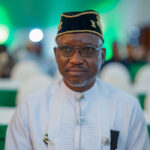
The Federal Government, on Tuesday, declared to Western nations in Europe and America that Nigeria would not stop the exploration of fossil fuels despite the pressure being mounted by the West for the discontinuation of investments in fossils.
It also stated that some of the countries in Europe and America had been investing in fossils but were asking Africa to stop further exploration of crude oil on the continent.
The Minister of State for Petroleum Resources, Heineken Lokpobiri, who disclosed this at a summit in Abuja, also revealed that the Federal Government was working hard to halt the complete divestment of International OIl companies out of Nigeria.
He said, “I was in Davos in January and I was privileged to participate in several panels and everybody was talking about the abandonment of fossil fuels, and that people should not invest in fossil fuels. And I ask one American diplomat by saying look, why don’t you start with America?
“America is the highest producer of oil, they are ramping up production but they are asking us to stop. Remember that last year, the United Kingdom, under the present prime minister, gave about 100 licences for oil exploration.
“This means that the West is not slowing down in exploration, but we are being asked to slow down or stop investments in fossil fuel. I’ve always told them that we are not the problem, we are the victims and we will transit at our own pace.”
The minister noted that Norway and many other countries in the West were still investing in fossil fuel exploration, but ironically they had been urging African countries to halt production.
“Our target is to explore these resources in a more environmentally friendly and sustainable way. We are not stopping! We need the money to be able to transit, and for us to transit, we will get the right investments,” Lokpobiri stated.
He also stated that the country must increase its crude oil production in order to meet both domestic and international obligations.
He expressed optimism that with the rehabilitation of NIgeria’s refineries, the demand for foreign exchange for the importation of petroleum products would be reduced once the refineries come onstream.
“I’m aware that most of our forex goes to the importation of refined products, but now that we are rehabilitating our own refineries, which will come into full operation by the end of this year, some of them have already started.
“Port Harcourt refinery, the first phase has started, Warri is about to be completed between now and the next two months, Kaduna will come. All will be rehabilitated,” the petroleum minister stated.
Lokpobiri further told delegates at the global summit that no international oil company was leaving Nigeria, stressing that they were only going deep offshore.
“No IOC is leaving Nigeria, they are mainly going deep offshore. And deep offshore involves billions and is exclusive for the IOCs, because it requires billions of dollars which the indigenous players may not be able to raise the funding for,” Lokpobiri stated.
He stressed that all divestment issues would be resolved within a very short time based on the directive of President Bola Tinubu.
This came as the Nigerian National Petroleum Company Limited stated that its role in the divestment of the IOCs from onshore and shallow water assets in the country was that of a facilitator and not an obstacle.
The Group Chief Executive Officer, NNPCL, Mele Kyari, explained that by virtue of its statutory mandate as the enabler of national energy security, NNPCLs role was to ensure that there was optimal and sustainable production from the divested assets.
Kyari also disclosed the company’s willingness to invest in the proposed African Energy Bank as a way of ensuring sustainable funding for energy projects in Africa to guarantee energy security.
On investment in energy infrastructure to drive energy security, the GCEO said the completion of the Obiafu-Obrikom-Oben Pipeline was in sight as the tunnelling across the River Niger was currently ongoing.
He assured stakeholders of the company’s commitment to work with them to close the energy deficit gap and create prosperity for Nigerians, adding that from all indications, all issues of energy scarcity in the country would be over in the next 10 years.
The event saw the participation of key industry and governmental figures, including Haitham al-Ghais, Secretary-General of OPEC; Omar Farouk, Secretary-General of the African Petroleum Producers’ Organisation; petroleum ministers for oil and gas, among others.





